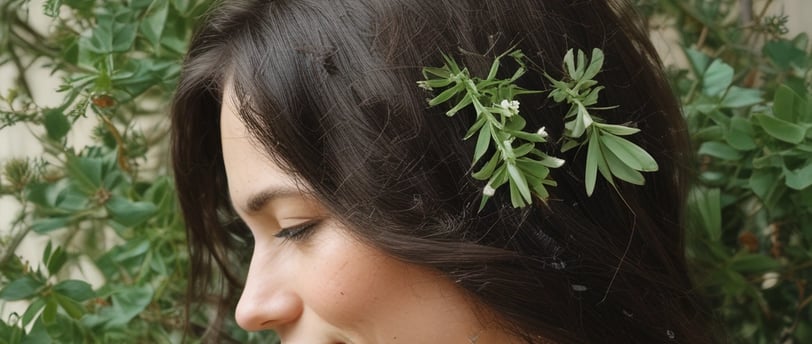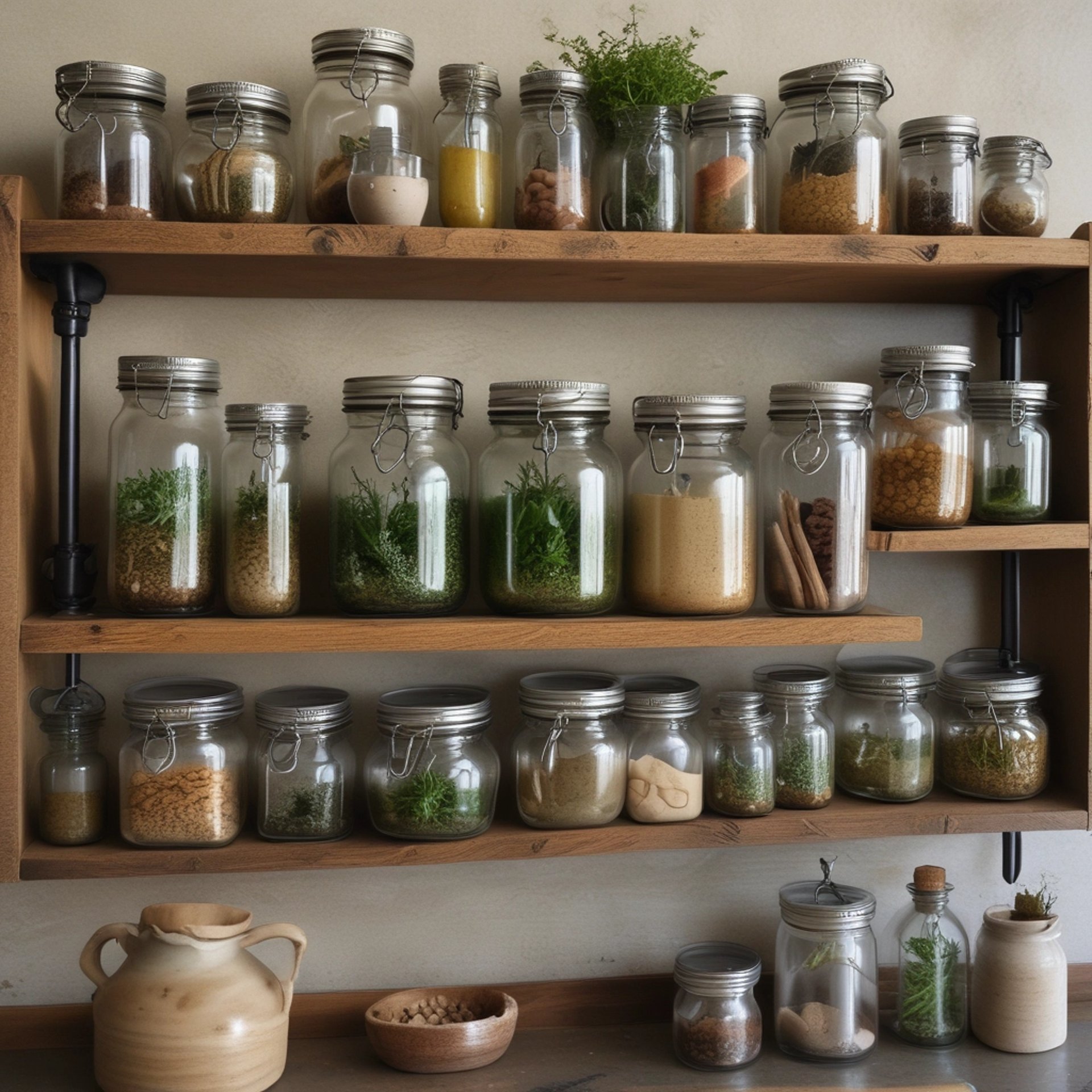Natural Home Remedies for Dandruff Using Backyard Herbs
4/1/20259 min read


Introduction to Dandruff and Its Causes
Dandruff is a common scalp condition characterized by the shedding of dead skin cells, often accompanied by itching and irritation. The condition can manifest in varying degrees, from mild flakiness to more severe scaling that may become problematic and affect an individual's quality of life. Affected individuals may notice white or yellowish flakes in their hair or on their shoulders, which can be both embarrassing and inconvenient.
The root causes of dandruff are multifaceted and can vary from person to person. One significant factor is dry skin, particularly during colder months when indoor heating can exacerbate dryness. This lack of moisture often leads to the scalp becoming itchy and flaky. Conversely, excess oil production on the scalp can also contribute to the development of dandruff. Oily skin provides a conducive environment for Malassezia, a type of fungus that thrives on the scalp and can irritate hair follicles, ultimately leading to increased cell turnover—a core feature of dandruff.
Beyond dryness and oiliness, other factors such as stress, hormonal changes, and dietary habits can influence the occurrence of this condition. Furthermore, individuals with underlying skin conditions, such as eczema or psoriasis, may also be more susceptible to experiencing dandruff. The prevalence of dandruff spans various demographics, affecting people of all ages and backgrounds. It is noteworthy that dandruff is not limited to the physical appearance of the scalp; it can impact overall hair health, leading to additional issues such as hair loss or reduced luster.
Understanding the various causes of dandruff is crucial for effectively implementing home remedies. By addressing the specific condition of the scalp, individuals can take meaningful steps toward achieving a healthier scalp and, consequently, healthier hair. Exploring natural remedies that leverage backyard herbs could be beneficial in managing this common yet troubling condition.
Exploring Natural Herbs for Dandruff Remedies
Maintaining a healthy scalp is essential for preventing dandruff, and many individuals may be surprised to learn that various herbs commonly found in their backyards can provide significant relief. These natural remedies not only contribute to a healthier scalp but also harness the power of nature in combating dandruff effectively.
Neem is one of the most potent herbs for treating dandruff. Known for its antibacterial and antifungal properties, neem can help eliminate the scalp fungus that contributes to flaking and irritation. Using neem leaves, individuals can create a soothing paste by grinding them with water and applying it directly to the scalp. Letting the mixture sit for 30 minutes before rinsing can promote a healthier scalp environment.
Another noteworthy herb is rosemary, which is celebrated for its ability to enhance scalp circulation, promoting hair growth and reducing dandruff. Rosemary oil can be diluted in a carrier oil and massaged into the scalp, allowing its anti-inflammatory properties to soothe irritation. Regular application of this remedy not only addresses dandruff but also revives the hair's natural luster.
Aloe vera is another backyard gem that holds numerous benefits for hair health. This succulent plant is rich in antioxidants and has both antifungal and antibacterial properties, making it effective against dandruff. Extracting fresh aloe vera gel and applying it directly to the scalp can help combat dryness and flaking. The application of aloe vera twice a week can provide relief from dandruff while also conditioning the hair.
Incorporating these herbs into DIY remedies emphasizes the power of nature in addressing common scalp issues. By utilizing neem, rosemary, and aloe vera, individuals may find effective solutions for managing dandruff, promoting not just a cleaner scalp but also healthier hair overall.
DIY Hair Masks for Dandruff Treatment
Dandruff is a common scalp condition that can often be addressed effectively using natural ingredients found in your kitchen. Creating homemade hair masks with backyard herbs can help soothe the scalp, reduce flaking, and promote healthier hair. Below are several simple recipes that utilize the benefits of herbs and other natural substances to create effective solutions for dandruff.
One popular combination is a tea tree oil mask, which is known for its antifungal properties. To prepare this mask, mix two tablespoons of coconut oil with five drops of tea tree oil. Apply the mixture directly to your scalp, massaging it in to ensure even distribution. Allow the mask to sit for about 30 minutes before washing it out with a gentle shampoo. This mask not only targets dandruff but also hydrates the hair.
Another effective treatment involves using aloe vera, a plant revered for its soothing qualities. Blend half a cup of fresh aloe vera gel with one tablespoon of honey, which acts as a moisturizer. Apply the mixture to your scalp, leaving it on for 30 minutes. Rinse off with lukewarm water. This mask nourishes the scalp while alleviating dryness associated with dandruff.
For those interested in a herbal infusion, a mixture of neem and hibiscus provides potent antimicrobial benefits. Boil a handful of neem leaves and hibiscus petals in water, cool, and strain the mixture. Use this concoction as a rinse after shampooing to help reduce dandruff significantly.
Finally, an oatmeal mask combines the absorbing properties of oats with the moisturizing effects of yogurt. Mix one cup of ground oats with half a cup of yogurt and a few drops of lemon juice. Apply it to the scalp for 20 minutes before rinsing thoroughly. This combination aids in exfoliating the scalp while balancing moisture levels.
In conclusion, these DIY hair masks not only utilize natural backyard herbs but also promote an enjoyable and sustainable way to combat dandruff effectively. Regular application of these recipes can lead to a healthier scalp and improved hair health overall.
Step-by-Step Guide on How to Remove Dandruff from Scalp
Removing dandruff from the scalp requires a systematic approach that incorporates both routine care and the use of natural remedies. To begin, individuals should focus on the washing routine as it plays a critical role in controlling dandruff. It is advisable to wash your hair two to three times a week using a mild, sulfate-free shampoo specifically designed for dandruff. This helps to maintain the scalp's natural oils while effectively cleansing away flakes and excess sebum.
In addition to a regular washing schedule, incorporating natural remedies that utilize backyard herbs can enhance scalp health. Plant-based options such as neem, aloe vera, and rosemary have been shown to possess antifungal and anti-inflammatory properties, making them excellent choices for tackling dandruff. Prepare herbal infusions or masks, and apply them generously to the scalp two times a week. Allow these treatments to sit for at least 30 minutes before rinsing with lukewarm water.
When applying remedies, ensure that the application is thorough. Part the hair into sections to guarantee that the scalp is adequately covered. Use a gentle massaging technique to facilitate absorption and improve blood circulation. This not only helps to deliver the beneficial properties of the herbs deeper into the skin but also alleviates scalp irritation often associated with dandruff.
Further, consider complementing these methods with a healthy diet rich in omega-3 fatty acids, antioxidants, and vitamins, as nutrition plays a vital role in skin health. Staying hydrated is equally important, as it helps maintain scalp moisture levels and prevents dryness.
In conclusion, a consistent washing routine, combined with regular application of herbal remedies and proper dietary habits, can significantly help in the removal of dandruff, leading to a healthier scalp over time.
Additional Tips for Maintaining Healthy Hair and Scalp
Maintaining a healthy scalp is fundamental in the quest to prevent dandruff and ensure optimal hair health. One of the primary factors in achieving this is through a balanced diet rich in vitamins and minerals. Nutrients such as zinc, omega-3 fatty acids, and B-vitamins can significantly enhance scalp health. Foods like nuts, seeds, fatty fish, and leafy greens are beneficial choices that can help in creating a flourishing environment for hair growth and reducing flakiness caused by dandruff.
In addition to dietary considerations, proper hydration is essential. Water plays a vital role in maintaining the moisture balance in the scalp. Dehydration can lead to dryness, exacerbating dandruff issues. It is recommended to consume around eight glasses of water a day, but individual needs may vary. Incorporating hydrating foods, such as cucumbers and watermelon, can also supplement your daily water intake.
Stress management is another critical aspect of maintaining a healthy scalp. High levels of stress have been linked to various scalp conditions, including increased dandruff. Engaging in relaxation techniques such as yoga, meditation, or even a simple walk can be effective. Regular physical activity also helps to reduce stress and improve circulation, which benefits the scalp environment.
Moreover, practicing proper hair-washing techniques can directly contribute to reducing dandruff. It’s important to use mild shampoos that do not strip the scalp of its natural oils. Washing hair regularly with lukewarm water helps to prevent oil accumulation, which can lead to dandruff. Additionally, ensuring that all shampoo is thoroughly rinsed out can minimize irritation, thus supporting a healthier scalp.
By integrating these daily habits into your routine, you can foster a healthier scalp and hair environment that effectively counters dandruff and promotes overall hair vitality, highlighting the undeniable connection between overall health and scalp conditions.
Success Stories: Real-Life Experiences with Home Remedies
Many individuals have turned to natural remedies in their quest to combat dandruff, often with remarkable success. One such story comes from Sarah, a 28-year-old teacher who struggled with persistent flakes for over a year. Frustrated with store-bought shampoos that failed to deliver results, she decided to experiment with a mixture of neem leaves and coconut oil. After applying this remedy consistently for several weeks, Sarah noticed a significant reduction in dandruff, coupled with a soothing effect on her scalp. This personal experience solidified her belief in the power of natural solutions.
Similarly, Mark, a 35-year-old engineer, shares his journey of dealing with dandruff for nearly a decade. After being recommended to try a homemade apple cider vinegar rinse, he was initially skeptical. However, after mixing equal parts apple cider vinegar and water, he found the results to be surprisingly effective. Through regular use, he observed a remarkable decrease in flaking and itchiness. Mark’s experience highlights how simple, natural ingredients can yield positive outcomes.
Another notable testimony came from Linda, who faced severe dandruff exacerbated by stress. In search of a holistic approach, she turned to hibiscus leaves and flowers. By preparing a paste and applying it to her scalp, she felt a change not only in her dandruff levels but also in her overall scalp health. Linda's story resonates with many who seek to maintain their well-being through backyard herbs. The incorporation of such treatments allowed her to embrace a more natural lifestyle while effectively addressing her dandruff issues.
These testimonies reflect how individuals can achieve success with home remedies, further encouraging a shift towards natural approaches in addressing dandruff. The long-term results from these experiences validate the effectiveness of utilizing herbs found in backyard gardens. While everyone's experience may differ, these stories inspire readers to consider herbal solutions for their own dandruff concerns.
Conclusion: The Path to Dandruff-Free Hair Naturally
In exploring the benefits of natural home remedies for dandruff, it becomes clear that backyard herbs bring a wealth of advantages to those seeking effective solutions. These remedies offer a holistic approach, harnessing the therapeutic properties of various plants often readily available in gardens or local markets. By integrating these natural ingredients, individuals can experience relief from dandruff while minimizing exposure to harsh chemicals commonly found in commercial products.
Consistency is key when adopting these remedies into one’s hair care routine. Regular usage of herbal treatments such as rosemary, neem, and aloe vera can significantly improve scalp health and alleviate flakiness. Each herb presents unique components that target the underlying causes of dandruff, including dryness and irritation. For example, aloe vera is renowned for its soothing properties, while neem boasts antifungal characteristics, making both excellent contenders in the battle against dandruff.
Readers are encouraged to take proactive steps towards enhancing their scalp condition. Experimenting with different DIY remedies allows for a personalized approach to hair care, catering to individual hair types and conditions. The journey towards healthier hair can be a matter of trial and error, but the rewards of naturally nourished hair make the effort worthwhile.
By empowering themselves through knowledge of these herbal remedies, individuals can regain control over their hair health. It is advisable to document the effects of various treatments, as this may help pinpoint which solutions yield the best results. This personalized experience will not only bolster confidence but also foster a deeper connection to one’s natural hair care routine.
In conclusion, the incorporation of backyard herbs into one’s regimen can lead to a dandruff-free scalp and overall enhanced hair vitality. With persistence and a willingness to explore, achieving healthy hair naturally is indeed an attainable goal.







